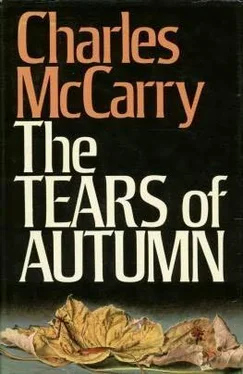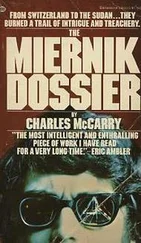He ducked through the entrance. As Nsango walked across the parade ground, the Congolese NCO presented arms, and even the Cuban came briefly to attention and saluted. Nsango left his own Kalashnikov behind with Christopher.
Manuel Ruiz was eating breakfast when Nsango showed Christopher into his hut. It was three o’clock in the afternoon. Manuel lived in what had been the chief's compound, in the largest house; the other Cubans were quartered in the adjoining wives’ huts. A half-dozen of the youngest terrorists were hoeing the cassava beds, their faces resentful as they wielded the bent sticks rubbed bare by women’s hands and left behind when the villagers fled.
Manuel Ruiz said, “Have you eaten?”
When Christopher shook his head, Ruiz pushed a boiled yam and a knife across the table and poured warm beer from a liter bottle into a canteen cup. The Cuban was a young man, no more than thirty, with curly hair growing to his collar. He cultivated an air of menace that went badly with his smooth face and his wide frank eyes and snub nose. His skin was pale and he had the tremor of the dysentery victim. He ate and drank efficiently, without pausing to taste, as though to quiet his body in order to go on to more important things with the least possible delay. His eyes never left Christopher’s face. The yam was dry and overcooked; he washed down each bite with a mouthful of beer.
Sunlight fell in splinters through the thatched roof, striping Manuel’s green uniform. He had arranged his belongings around the walls-cases of ammunition stenciled with Cyrillic writing, a rack of weapons, unopened boxes of rifles, an American radio that ran off a gasoline generator. Pictures of Fidel Castro and Lenin, and a poster showing abject prisoners taken at the Bay of Pigs and their outdated American weapons, had been pinned to the sloping ceiling.
Ruiz finished his yam, wiped his lips with the back of his hand, and said, “Now. What are you doing in this installation?” He spoke grammatical French, and mixed with his adenoidal Latin American accent were some Congolese intonations.
“Nsango has explained how I got here.”
“Yes,” Manuel said. “But not why. You and he are old friends.”
“Yes.”
“He says you’re an activist, that you’ve helped him.”
“I’ve always admired Nsango.”
Christopher handed Manuel the knife he had loaned him, handle first. It, too, was American, a new-issue, short-bladed bayonet.
“What I want to say to you has something to do with your work in another place,” Christopher said. “I bring you some help for what you’re doing here.”
“Oh? What are your auspices?”
“I’ve brought you a gift from a friend-Do Minh Kha.”
“Do?” Manuel said. “Do Minh Kha? A gift from him? Where did you see him?”
“I didn’t. He passed it to me through a friend in Saigon. He wanted to bypass ordinary channels. He said you’d understand why.”
“And the friend in Saigon-what was his name?”
Christopher paused to give it weight. “Lê Thu.”
Manuel took the name, but not eagerly. Christopher watched the Cuban’s reaction as an angler watches his line, drawn through the water by a sluggish fish. He decided to let it go for the moment. There was no reason why the Vietnamese would have told Manuel the code name for their operation: he did not need to know. But they would have had to give him some hint, and it was possible they had given him more than that. If they talked not at all to outsiders, intelligence officers talked too much to each other.
“What were you doing in Saigon?” Manuel asked.
“Working. My work is mainly in that camp.”
“And your name, Nsango tells me, is Charron?”
“Yes.”
“You knew where to find me, you knew my name, you knew Nsango could bring you to me?”
“I had some assistance.”
Ruiz drew the dull edge of the bayonet down the bridge of his nose; when he brought the blade away it was filmed with sweat and he shook it off the steel with a snap of his wrist. “That’s a little disturbing,” he said.
“Then you should dress less conspicuously,” Christopher said. “Even operating at night, that costume of yours is easily recognized. You’re in a place where white men draw attention just by being white, and you’re dealing with people who don’t know the meaning of discretion. Nsango’s men are not Nsango.”
Manuel tugged at the lapel of his fatigue jacket and glanced at his tarnished badge of rank, earned with Castro in the Sierra Maestra. “We’re used to these clothes. They symbolize something.”
“Well, it’s no concern of mine,” Christopher said. “You may have better success than others who’ve tried to do what you’re doing. Success is more important than security, after all.”
“Is it not? All right, what does Do want?”
“To thank you. To give you this for your work here.”
Christopher counted twenty thousand Swiss francs, in sodden thousand-franc notes, onto the bamboo table. Ruiz sat with his hands in his lap, gazing at the money.
“Very handsome of Do,” he said. “What’s it for?”
“As I said, for your work-a gesture of solidarity.”
“Yes-but in return for what?”
“Lê Thu,” Christopher said.
“What is Lê Thu?”
“I was told you’d understand. If you don’t, so much the better for Do’s security.”
“I spent ten days in Hanoi. I didn’t become fluent in Vietnamese.”
“In French the name means ‘the tears of autumn.’ ”
Manuel Ruiz’s eyes moved away from Christopher’s. He sat very still, then picked up the stack of pink bank notes. Christopher knew the signs, knew he had been right.
“Las lagrimas del otoño,” Manuel muttered. “How did you come by that phrase?”
“I help out, when I can, with some of Do’s operations. He can’t move freely outside his own country-he stands out, as you do among these blacks. Money, for example, must be carried and delivered.”
Manuel nodded and cleared his throat. “It’s remarkable what they can accomplish, Do and his people. But you’re right, of course, their race limits them. They have to rely on others from time to time.”
“Once again, security is sometimes less important than success.”
“There’s no such thing as security among professionals. You’re here. I wouldn’t have thought that possible.”
Ruiz folded the money in half and stuffed it into his breast pocket. He fastened the metal button.
“Frankly,” Christopher said, “Do didn’t think what you did was possible. He’s very grateful. You were the key.”
Manuel leaned back in his chair and slapped his palm with the flat of the bayonet. He struggled with a smile of pleasure, then submitted to it. He had large even teeth.
Manuel Ruiz’s mind opened with an almost audible click. Christopher had seen this happen before to men who had done great things in secret. No matter how disciplined, they wanted admiration. Manuel, sent by Che Guevara into a Congolese rain forest, was a long way from people he could trust-who could understand what he had done. Christopher didn’t know whether Ruiz had decided to trust him or kill him, but he knew that Ruiz had decided to talk.
But not immediately. Manuel moved a stack of papers to the center of his desk, and wetting his thumb, began to go through them. After a time he looked up and recoiled in mock surprise, as if he had forgotten that he had a guest.
“You must excuse me now, I have urgent work,” he said. “You’ll stay the night, I suppose? Eat supper with me.”
“Gladly. I have some Polish vodka in my bag. Do you like it?”
“No, but I’ll drink it, Charron.”
Outside, in the scorched white light of afternoon, nothing moved. Christopher heard African laughter coming from the huts and a radio playing songs in one of the Congolese languages. The sun had dried the cassava beds so that the soil was as fine as rouge.
Читать дальше












